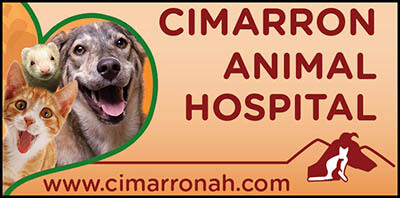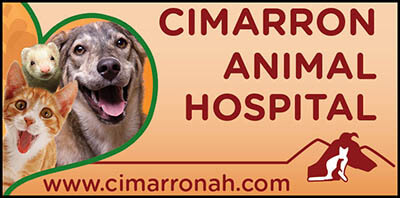 Rattlesnake Season is upon us. Our venemous desert vipers will soon be stirring for their first post-hibernation meals– hungry, cranky, and with full venom glands. Our curious pets are at highest risk for the most severe bites in the spring months when most bites are venemous and snakes have the meanest tempers and the fullest venom glands (saved up since their last meal in the Fall)!
Rattlesnake Season is upon us. Our venemous desert vipers will soon be stirring for their first post-hibernation meals– hungry, cranky, and with full venom glands. Our curious pets are at highest risk for the most severe bites in the spring months when most bites are venemous and snakes have the meanest tempers and the fullest venom glands (saved up since their last meal in the Fall)!
Rattlesnake bites are extremely painful! Pets that are bitten will usually develop obvious swelling in the bitten area– usually the face or a paw. If you find oozing puncture wounds, you know your pet has been bitten, but often those punctures are hidden in the swollen tissue. As the venom penetrates the tissues, it causes tissue necrosis, or death and sloughing. The venom also leeches into the blood stream, affecting other organs. Rattlesnake venom can cause death by kidney failure or spontaneous destruction of blood cells in the vessels. All rattlesnake bites to pets are a veterinary emergency!
There is no First Aid treatment for rattlesnake bites in pets except to keep themn quiet, move the affected area as little as possible and get to your Vet or an Emergency Vet immediately. Once there, your Veterinarian can determine the best treatment for your pet, based on his condition. Standard treatment includes IV fluids and treatment for shock. Your veterinarian will probably recommend antivenin. Pain and infection will be addressed as well. At Cimarron Animal Hospital, we can offer Cold Laser Therapy to the affected area to immediately help reduce swelling and pain and significantly reduce the amount of tissue loss as well!
RATTLESNAKE VACCINE for dogs helps reduce the severity of rattlesnake bites caused by most of our desesrt species! The vaccine induces an immunity that inactivates the venom, minimizing pain, swelling and the risk of organ failure and intravascular hemolysis. Dogs still need to be seen immediately by their veterinarian for treatment of the post-bite infection (snakes have dreadful bacteria in their mouths!), and any residual venom effects not completely counteracted by the vaccine immunity, but the treatment should be less intensive and less expensive!
PREVENT snake bites by keeping your dog on a leash while walking in the desert. Stay alert to the sound of rattles on the side of the path and slowly walk away. Avoid leaving your dog in open desert areas as much as possible.
For those dogs at risk because they live in desert yards, frequent parks and washes or hunt with their masters, PROTECT them with Rattlesnake Vaccine. Pets receiving Rattlesnake vaccine for the first time will need two vaccines 4 weeks apart. The vaccine is protective for 6 months, so boosters every 6 months are important for continuous protection. If the boosters are not given every 6 months, the maufacturer recommends the double series be given once a year, 1 month prior to Rattlesnake Season.
For more info about the vaccine, http://rattlesnakevaccinefordogs.com/
Contact Us if you have any questions about rattlesnake vaccine or would like to schedule your pet’s vaccines. 886- 1125 [email protected]


